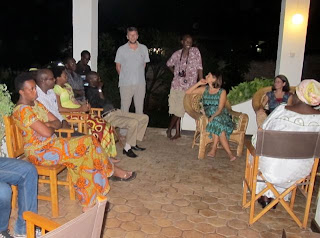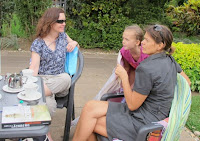If 50% of our job as country reps is travel, then I would
have to say that the other 90% is hosting guests. Not that we mind too much. The Bible says that hospitality is a spiritual
gift so maybe we are just really blessed.
In the past 3 weeks we have hosted a continuous number of people
starting with Zachee and Bridget two weeks ago but continuing even up to today.
I will back up and try to fill in some of the details. Zachee and Bridget left last Sunday morning
to return to Canada, and on Monday I also left the country for Kigali by
car. I went with Felix to meet some
partners and the host families of our SALTers to take care of various bits of
business. I was there for several days
and during that time I had a chance to do some social visiting with host
parents who are all affiliated with the friends church as well as some of the
missionaries there, particularly Dave and Debbie Thomas who have been living
and working in Rwanda for the last 17 years, I believe.
I also had the chance to go on a field visit to one of our
projects. It was a training for a number
of rural agricultural groups on how to do savings together with the Village
Savings and Loan model. It has been amazing
to see this very effective program transform communities as people pool their
resources then lend to each other (with interest) and eventually raise enough
capital to buy everyone a cow, for instance, or other asset.
Although the training was in Kinyarwanda, I could understand
what was going on well enough and was encouraged by the work I saw there.
 |
| Matt & Bash |
I saw our volunteers as well and when we left I took our two
SALTers, Alyssa and Janelle with me and Matt Gates, our agronomist followed us
in his car (with his new puppy “Bash” in tow.)
I stopped by Burasira on the way back to Bujumbura and picked up
Terri-Lynn as well. She had just
finished doing mid-term exams in all her classes as the school prepares for a
two week Easter break.
The reason we were all convoying down to Bujumbura was to
have a team gathering to discuss MCC values and how they apply to the work we
are doing in our assignments. It is a
once yearly activity that MCC expects us to do.
But although it might sound a bit redundant, it is actually very
interesting to consider each year.
The trip was a bit rough as we were delayed by an hour at
the border because when I bought the SALTers visas, the immigration officer did
not have the $20 change I was supposed to get back. It literally to an hour of waiting for him to
return with money for change. We sat at
the border the whole time waiting for the problem to be solved and frustrated
that he would not give change in local currency despite our request for him to
do so. Eventually we were able to leave
only to come upon an accident (truck went over a steep embankment) later on the road that took another 30 minutes to
clear.
When we arrived in Bujumbura, we found Melody and Yolanda
were already down from Gitega and were helping Rebecca set up for dinner and
prepare materials for the meetings.
Matt was the last to arrive, but by Thursday evening we were
all together for dinner and shared fajitas and enjoyed visiting.
We ended our evening with worship following an Anabaptist
Lenten liturgy leading up to Holy week.
Everyone seemed very pleased to be together and we had the 4 Rwanda
folks in our house while Melody and Yolanda stayed with Jennifer (who lives
about 2 blocks away.)
On Friday morning we took the kids to school in the morning
and then began meeting in earnest beginning with worship and a time of sharing
what we do in our work and the things that have encouraged us in the last few
months.
We began our values discussion after that and followed a
form which identifies 8 values of MCC that are expected to be evident in our
programming, but also modeled in our individual lives.
It struck me that this is something that one either loves or
hates about MCC. There is an
expectation, in fact a requirement that those working for the organization
model the values that we exhibit programmatically. I could imagine some that would consider that
perhaps overbearing, even invasive, but I think it is one of the things that
makes our organization unique from so many other NGO’s doing development
work.
It is not just a matter of being Christian either. There are many here working as Christians in
Christians organizations. It is how our
faith expresses itself in particular ways regarding, service, justice, and
standing with the poor and marginalized.
Here are the values we discussed:
 |
| Yolanda |
Relationships—This has to do with the way we
treat each other and our partners. We
realize that relationships are the key building blocks of our programming, but
do presume a certain level of accountability with regard to the completion of
the work we are trying to do.
Learning—This recognizes that we are a learning
organization and we have as much to receive from our local partners as we have
to give. It presumes that we are not the
experts coming in, but we depend on partners and beneficiaries to help us shape
priorities in our programming.
Flexibility—This connects to the idea of
learning and reminds us that we must rely on others (local advisory counsels
and partners) to help understand the context and direct our programs.
Solidarity—This reminds us that we need to
attempt to immerse ourselves in the culture through language study, and
lifestyles compatible with those we serve and to particularly understand issues
of injustice in our context and be responsible to our privileges.
Non-violence—This is the Anabaptist commitment
to non-violent methods in resolving conflict, especially in confronting
injustices.
Servanthood—We must behave with humility in
relating to others, be accountable, both in terms of integrity but also
procedurally, and we should be aware of the informal power relationships that
may privilege us above others and not abuse them.
Collaborative Decision Making—Mcc is not
autocratic and there is an expectation that decision making will involve all
stake holders. Time will be taken to
give all a voice.
Involvement with the church—MCC does recognize
the church as the most significant agent of transformation in the world. We are expected to be accountable
individually and programmatically to a local church in our context.
As I said, above, you may react
positively or negatively to the idea that your employer is holding you
accountable to both uphold and practice its values. For me, I appreciate the challenge more and
more as I spend more time in MCC.
We had many discussions, some
bordering on debates as we worked through these values and ended by creating a
series of action points for the coming year to improve our track record on
these things.
We worked all day Friday and
Saturday, but did have time for games in the evenings. Actually on Friday afternoon I taught my
ballet classes as usual and appreciated having all 3 SALTers join the adult
class in the evening. Teri-Lynn has come
before, but it was the first time for Janelle and Alyssa.
On Sunday we had some worship
time together then headed to the beach for the afternoon. It was a beautiful day and we tried a new
place called Jenny’s Beach, which is a nice café with very attractive gazebos
out in the sand where you can order food an beverages. It features many salads and fruit drinks that
our just perfect for the beach. In
general I would give it a favorable review except the service was quite slow (an
hour and a half from ordering to receiving food.)
The kids enjoyed swimming in the
lake as did most of our team and we stayed there until early evening.
Monday morning the kids were back
in school and we managed to get our whole team out of the house and on to the
road. I gave them an 11 am check-out
time because we were expecting another set of guests by 2pm.
The transition promised to be
hard because one of our house staff was sick, so we all pitched in to get the
house cleaned, all the beds remade, and the kitchen restocked and ready for the
next set of guests.
Mark Sprunger, our area director,
arrived with Tim Lind the MCC Congo rep. and Michael Sharp, the MCC Eastern
Congo coordinator from Bukavu by 3pm that afternoon. The timing was perfect for us as we had just
finished getting the house back in order.
They are here for a subregional
MCC Great Lakes discussion. Our country
programs have much to talk about and coordinate. For anyone following the conflict in the
Great Lakes region, you could imagine the issues that might come up between
representatives representing Rwanda and those representing Eastern Congo in our
organization, especially as we try to help clarify advocacy positions for our
organization. In truth though, it is
really good to be together and discuss our region with them and share stories
about the radically different perceptions of the conflict from our Congolese
and Rwandese partners.
We had dinner together at Ubuntu
restaurant on our first evening together, then met at our house all day
Tuesday.
We will be done with all meetings
and hosting this coming Thursday, just in time for Easter and two weeks of
Spring break. We are trying to decide
what would be relaxing to do and give us time to make some much needed time
with our kids. At this time staying home
alone as a family and repainting the porch has the greatest appeal.
For more photos of our team gathering, you can check out this link. MCC Team Gathering
























